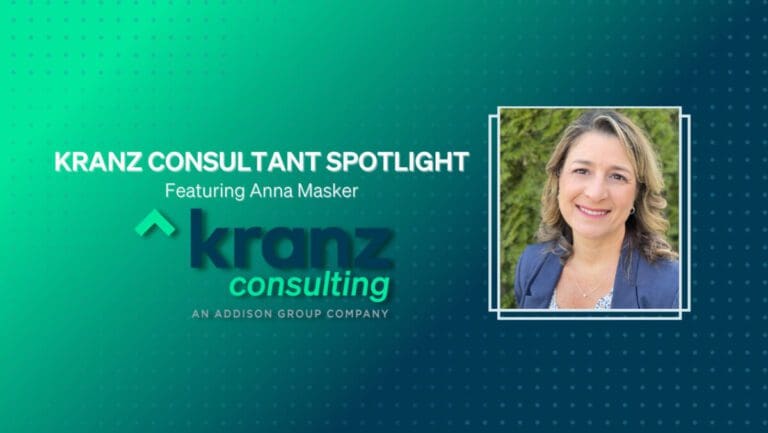
We are thrilled to highlight CFO and leader of our Digital Assets segment, Anna Masker. Anna joined Kranz in March 2023 and has made an invaluable impact across our team. Read more to learn more about Anna’s expertise, her passion for digital assets and crypto accounting, and how she enables her clients to thrive.
What is your alma mater? I received a Bachelor of Science from Manhattan College and graduated with an MBA from New York University.
What are your favorite hobbies? I really enjoy traveling, whether it is a road trip or flying somewhere with my family. I also like to cook and host large gatherings while trying out new recipes. For fun, I’ve also taken up trail running with my dog Charlie and enjoy hiking and being out in nature, especially at the beach or by a lake.
In what ways has your background impacted your experience as a consultant? I consider myself a non-traditional accountant. Considering that I earned two marketing degrees, working in accounting wasn’t in my original career plan. However, when I dove into finance, I began to understand how accounting is the language of business. I fell in love with the analytical side of finance and figuring out the story that the numbers tell. I always say, “Everything flows to the financials,” so if you are having a sales problem or an operational problem, you’ll see it reflected in your numbers. Being a non-traditional accountant, I feel that I am provided with a unique advantage to be able to “zoom out,” see the big picture, and propose solutions to our clients.
What does a typical workday for you consist of? I don’t think there is a “typical” workday for me — especially in crypto. With the way the digital asset space is constantly evolving, the first part of my day is checking the news and latest developments to understand how it impacts our clients. After I catch up on the crypto world, I like to touch base with my team at least once daily to check in on projects. Then, I spend the rest of my time making connections and building out the digital asset practice.
What kind of projects have you been working on at Kranz? I am focused on growing the digital assets segment for Kranz. Our team is in the midst of some interesting projects with clients who are launching their own cryptocurrencies, tokenizing real-world assets, and running Decentralized Autonomous Organizations (DAOs) that act like venture funds.
In addition to working on client projects, I’ve been involved in helping organize our first ever CFO Summit to bring leaders from our various practices together to build synergies, discuss challenges, and collaborate on innovative ways to grow our business.
Where do you believe you deliver the most value to clients? I’ve always been a big-picture thinker. I love brainstorming on strategy and process and finding unique market opportunities by capitalizing on our clients’ strengths. I like to understand a client’s business model and workflow, and I find that spending that time at the beginning of the engagement helps our clients articulate their processes and strategies. Once we define the strategy, we can start structuring their financials to match business goals and highlight the metrics they need.
How do you organize environments with a lack of reporting infrastructure or inefficiency? As sophisticated as blockchain technology is, it’s really quite remarkable how poor the reporting is! Each blockchain and protocol indexes data in a different way, so traditional general ledgers like NetSuite and QuickBooks don’t work for crypto. Crypto accounting requires specialized sub-ledger systems which are trying to keep up with the daily disruptions in the industry. Unlike traditional operational accounting systems that have been around for many years, crypto accounting and the relevant sub-ledgers are in their early stages of development.
When we start working with a client, sometimes they send us a list of their crypto wallets and a general idea of what their business does. We’ll take a look at their data and their business model then do a deep dive into their revenue model. In this discovery process, we might find additional entities, crypto wallets, or businesses that the client didn’t know about or forgot to mention. It sounds simple, but the discovery is an important first step.
Once we understand the business model, we look at what metrics would be helpful for that client and then design their financial statements and chart of accounts to yield the analytics they need to run their business. I’m a big fan of process mapping, as it is a very easy way to show how money flows through an entity and creates alignment between us and the client. A lot of our clients are excellent technical developers or salespeople – however, the financials are not always their strong suit, which is why they engage us. Our job is to help them develop the metrics, reporting and controls that they’ll need to run their business so that they can focus on their strengths – and they can leave the numbers and reporting to us.
